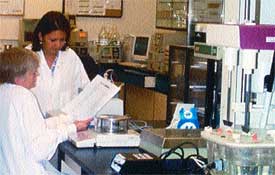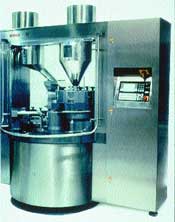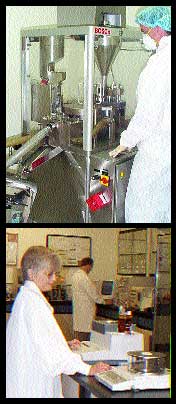Encapsulators meter just the right dose
January 29, 2014
Nutritional Laboratories Intl. (NLI) is really coming into its own. With sales growth of 43 percent in 2000 and growth of 50 percent expected for 2001, the successful drug manufacturer/contract packager and laboratory services company located in Lolo, MT, about eight miles south of Missoula, packs assorted herbal- and vitamin-based dietary supplements according to current Good Manufacturing Practices (cGMP) as it caters to larger distributors needing sophisticated systems. Though nutraceuticals sales have surged for many manufacturers, NLI is proud of its growth rates. To handle its burgeoning business, which includes production of at least 200 active products, as well as many others, NLI recently installed Robert Bosch Packaging Technology's high-speed encapsulators to fill orders for such capsuled products as Celestial Seasoning's Organic Garlic and St. John's Wort, and medicinals such as freeze-dried Cordyceps and Mycosoft® precursor nutrients from customer Fungi Perfecti, at top speed.
Currently, the company owns two Bosch GKF 700 encapsulators, one GKF 2000 that it purchased about a year ago and another GKF 2000 acquired in December '01. With them, NLI says it will continue to lead industry efforts to enhance consumer value in health and wellness through superior quality processes, methods and packaging. The quality NLI achieves by combining a healthful
|
NLI, above, blends and packages some 200 active products, some of which are pictured above, as well as many others. Products are encapsulated off-line in air-filtered rooms before being bottled. |
mountain attitude with sophisticated science proves its dedicated attention to proven operational methodologies such as statistical process control and scrutiny of raw materials and finished goods.
Explains Terry Benishek, president of NLI, "We've positioned ourselves as a high-quality contract manufacturer. We've certainly gotten the attention of many larger material distributors that recognize us as becoming a major manufacturer in the industry."
Well-monitored throughput
NLI installed the machines in its recently expanded 46,000-sq-ft facility–which is certified organic in order to manufacture certain products–in scenic Lolo, where part of the movie "A River Runs through It" was set. The trio of new machines was selected for its ability to meet the same exacting specifications that NLI sets for product formulations and work-in-process projects, Benishek says. Given his firm's emphasis on process control, he says the Bosch machines stood out for reliability, repeatability and productivity. "We contact vendors for pricing and to see if they can meet our specifications," he says. "When we were in the market for automatic encapsulators, we were just as rigorous in our approach. A lot of equipment was compared to Bosch. We never found anyone who didn't like Bosch machinery."
NLI's well-equipped laboratory and business-focused approach reflect a quality emphasis in all areas of the plant. There are few, if any, bottlenecks. Installed in their own air-filtered production rooms separate from the company's bottling line, the two GKF 2000 machines have digital heads that adjust dosing disk height. Sets of tamping pins deliver two rows of nine capsules each, with precise amounts of a variety of different types of powdered ingredients, at filling speeds of up to 2,500/min.
Speed is important. And, as a contract packager, NLI also demands quick changeovers and easy, thorough cleaning of equipment. "The encapsulators can be changed quickly, and there is little waste," Benishek tells PD. "That's important. Depending on the order and product, we may change over as much as twice a day. But we prefer to average changing them once every other day or day-and-a-half. Saving two or three percent in waste may not sound like much, but those few percent can mean a pricing advantage when going up against competitors."
NLI got its first GKF 700 S filling and closing machine about four years ago, and six months later, it purchased a second such machine. Currently running smaller-volume orders, the GKF 700 machines produce assorted capsule products in several sizes. NLI blends the different ingredients together based upon specific customer formulations and transfers the mixtures to the encapsulation rooms after several in-process inspections.
The economical 12-station GKF 700 gelatin-capsule-filling machines each use a five-up GMP tamping procedure designed to prevent dusting and product loss. A membrane keypad conforming to GMP standards allows operators to input variable information.
Randomly oriented capsules are fed from an overhead hopper and are oriented, top-up, by a clever device that grips each capsule's midsection. The device feeds the capsule into a slot that's tight-fitting at the top and loose at the bottom. This forces each tapered-shape capsule to align properly as it's pushed into format bores before being individually, mechanically separated and opened with vacuum-assist suction. As capsule bodies are exposed, they round their way in the machine to the dosing station for powder filling or later for pellet filling.
Should a capsule somehow find itself improperly placed into one of the upper segments of the machine, it is ejected by a mechanical vacuum device. As the capsules move to a placing station where the tops are replaced onto the bodies, they're then mechanically closed at the next station before being discharged. Vacuum cleaning of station segments follows to remove any dust particles.
|
Two large-capacity 12-station machines feature 18-up capsule filling/sealing at rates up to 2,500 cpm. |
NLI runs larger-volume orders on the pair of GKF 2000s. Suitable for filling and closing hard gelatin capsules from size 00 (largest) to 5 (smallest) with powder, pellets, tablets and even a combination of same, the larger-capacity PLC-equipped GKF 2000 operates basically the same way, though it features two capsule magazines containing nine tracks each, for 18-up capsule filling. This machine also features 12 stations, with the first two aligning capsule tops and bodies prior to separating them. The next set of stations dispenses pellets or tablets into the capsules should they require these, while the following station can deposit powder. The actual powdered or pelleted product enters by way of a stainless-steel enclosed hopper with a viewing window. Any of these filling stations may be bypassed or used in combination.
Capsule tops and bottoms are aligned into two rows of nine for top and bottom separation and filling. An air-gap adjustment feature and central exhaust are designed to accept difficult-to-handle products such as sticky or unusually shaped pellets.
|
One of two small-volume machines outputs about 700 capsulse/min, top. NLI's lab is certified organic in order to package certain products that are labeled as such. |
The seventh station in the machine rejects and vacuum-ejects faulty capsules, removing two-cap capsules or unseparated capsules. Next, the capsule tops and bodies are mated back together, and the completed capsules eject as the machine goes into cleaning mode, evacuating any particles with compressed air before the next group of capsules enters. The capsules then require several quality assurance inspections before being transferred to the bottling operation or are bulk-packaged for shipment to customers who bottle the products themselves.
Speed, reliability aids process flow
While precision is important, Benishek emphasizes that with consumer demand for nutraceuticals still at full throttle, equipment reliability is key. The GKF 2000 machines occasionally must run 24 hours a day for a month straight to fill all of the orders requested, he says. "And they stand up very well." A quality assurance inspector weighs filled samples every 15 minutes during production runs. "Our quality assurance personnel find that the repeatability is very good. The GKF 2000 does an excellent job of maintaining weights, and I believe we keep tighter control on our weights than many other manufacturers."
Nutraceutical manufacturing is more complicated than it seems, Benishek points out. Formulations generally can incorporate at least a half-dozen raw materials that must be blended. Some require more than 50 ingredients. The processing becomes complicated very quickly when considering the raw materials' uses are all-natural, like the company's local western Montana surroundings.
"Natural-product particle size, the level of the active ingredients, moisture content and color deviations can create a lot of variation that has to be compensated for," he says. "That can affect how the process runs. If the density and flow characteristics aren't right, there can be manufacturing problems. By controlling those factors up front, we have the opportunity to keep our production and packaging speeds up."
An open machine design allows operators to get into tight spots to clean, maintain or change the encapsulators. Changeovers, which are critical to NLI, are a matter of switching a set of changeparts on the GKF 2000 to handle capsule sizes from 00 to 4, in NLI's case, and take as little as two hours. That may sound extensive, but NLI pays strict attention to the process, which involves a complete disassembly of each machine and its product-contact parts, according to Food & Drug Administration Guidelines. The process also includes a thorough washing, cleaning and sanitizing of machine components and of the walls, ceilings and floors in the room. The electronic controls make fill adjustments and changeovers simpler. Electronic, production and mechanical functions on the machine are all separate, which facilitates cleaning and service, NLI says. Machine surfaces are rounded to make them easy to clean and access.
NLI monitors machine throughput carefully, Benishek adds. The GKF 2000 encapsulators run about three times the amount of product in the same amount of time as the smaller-capacity GKF machines, he says. "It's very important to keep the Bosch equipment running at speeds that maximize our investment. We have a lot of confidence in it. We've had such a good experience with Bosch that we plan to replace the two older machines with four or five GKF 2000s over the next few years."
More information is available:
Encapsulators: Robert Bosch Packaging Technology, Inc., 763/424-4700. Circle No. 235.
About the Author(s)
You May Also Like





